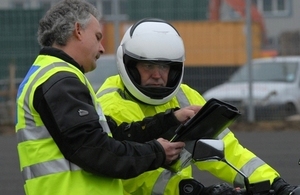Motorcycle manoeuvre testing to remain off-road following review
Off-road manoeuvre test is safer and cheaper review concludes.

Motorcycle testing
A thorough review of motorcycle testing has concluded that an off-road manoeuvre test is safer and cheaper, Road Safety Minister Stephen Hammond announced today (4 July 2013).
Currently, the motorcycle test is conducted in 2 parts – the first involves demonstrating specific manoeuvres off-road and the second is an on-road test.
The Motorcycle Test Review was commissioned to look at the feasibility of moving the off-road manoeuvres part of the test onto the road and has concluded that this would increase injuries and costs. The government will therefore not implement a single-event on-road motorcycle test.
Since the review started, the Driving Standards Agency (DSA) has introduced changes to make the test more accessible – including opening additional test centres and setting up an online booking service for trainers.
Stephen Hammond said:
Motorcyclists are disproportionately represented in casualty statistics - they make up just 1% of road users but 19% of all road accidents - so it is especially important that new riders coming onto the roads have the right training behind them so they can ride safely and confidently.
The Motorcycle Test Review explored whether the whole of the practical motorcycle test could be carried out on the road without jeopardising rider safety or test standards and without increasing costs. The research clearly shows that such a move would increase incidents and cost more money.
However the DSA has taken action to make it easier for those wanting to get their motorcycle licence to book a test and find a convenient test centre.
During the Motorcycle Test Review the DfT and the DSA worked closely with a range of stakeholders, including trainers.
Research carried out for the review showed that an on-road manoeuvres test would lead to 17 times the number of serious incidents per year – especially as a result of the higher speed exercises. The research also showed it would increase the duration of the test which would result in higher costs for both candidates and the DSA.
The research findings have been published today (4 July 2013) on the DfT website.
Notes to editors
Since the review started, the DSA has made the following improvements for stakeholders and customers taking motorcycle tests:
- increased its motorcycle examiner resource by targeted recruitment and encouraging existing examiners to relocate to areas of demand
- changed the order of manoeuvres to group the slower and higher speed exercises together. This included taking the emergency stop before the hazard avoidance; treating speeds at 5% below 50 kmh as a riding fault rather than a serious fault and reconfiguring the cones on exiting the circuit. These changes have been welcomed by both examiners and trainers and have resulted in fewer incidents, particularly during the avoidance exercise
- improved the booking process by actively monitoring trainer booking and introducing the new online business service
- trainers can now request both modules of the motorcycle test to be taken ‘back to back’
- accessibility – the DSA has opened 3 additional sites for module 1 tests and has recently announced 8 more sites for module 2 tests
- improved standards – since the new 2-part test was introduced, there has been an increase in the pass rate from 60.8% in 2009-10 to 70.6% in 2012-13
Department for Transport officials worked closely with a range of stakeholders during the Motorcycle Test Review. These included the Motorcycle Industry Association (MCIA), the Motorcycle Industry Trainers Association (MCITA), the British Motorcycle Federation (BMF), Motorcycle Action Group (MAG), Road Safety GB, the Royal Society for the Prevention of Accidents (RoSPA) and independent trainers.
Research carried out by the Transport Research Laboratory for the Motorcycle Test Review estimated the number of incidents that could occur if the module 1 test was carried out on-road was likely to range between 447 and 561 major incidents (those requiring 3 or more days off work from injuries sustained) per annum. In 2012/13, DSA had 29 comparable incidents during the Module 1 test and conducted 70,900 tests.
Roads media enquiries
Media enquiries 0300 7777 878
Switchboard 0300 330 3000